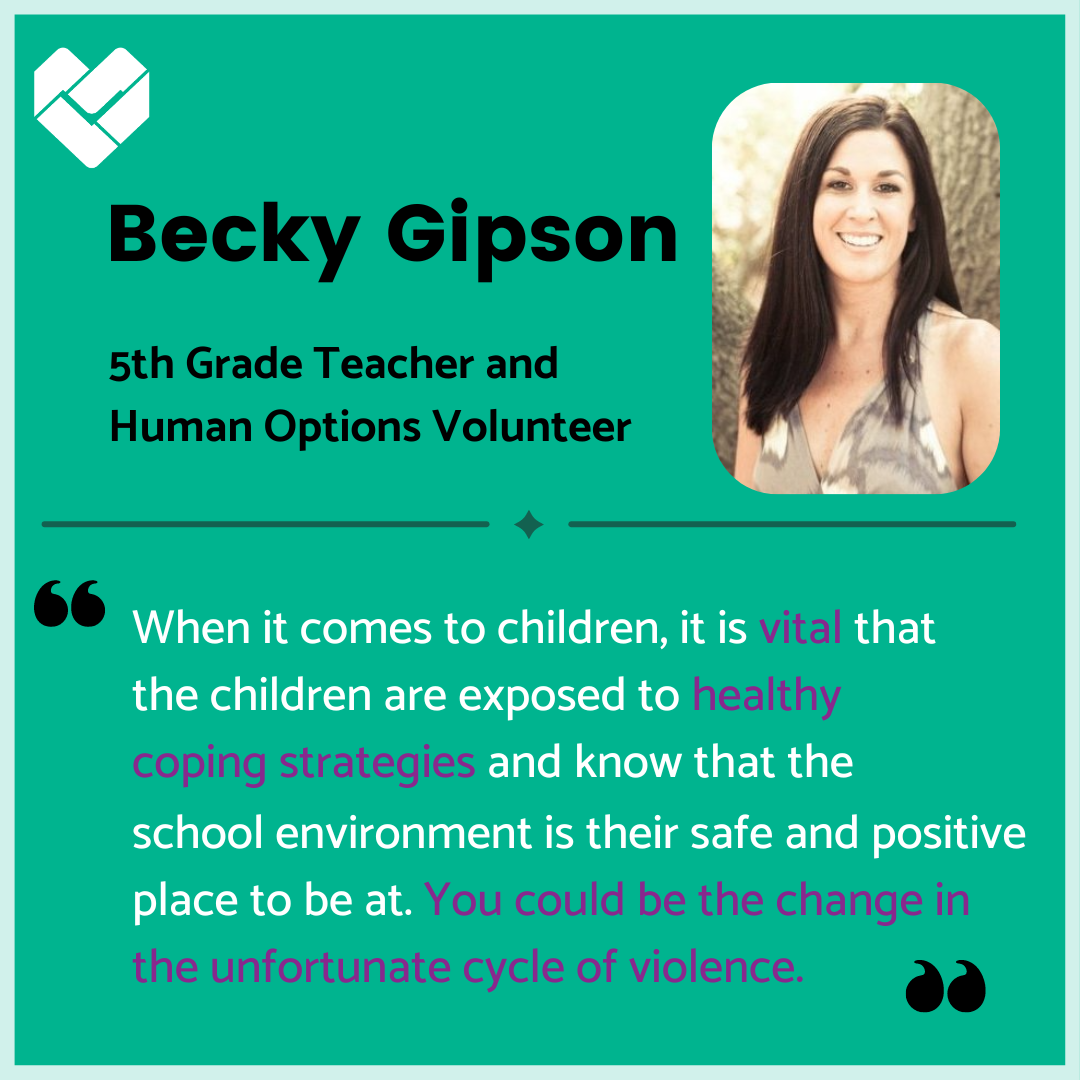Interview With: Becky Gipson, 5th Grade Teacher and Human Options volunteer
As students return to school, we had the chance to sit down with Becky Gipson, a dedicated 5th-grade teacher in Orange County and Human Options volunteer, to explore the profound impact of witnessing relationship violence on students’ academic performance and attendance. Discover how trauma from home influences concentration, sleep, and school performance, and how stress can lead to irregular attendance. Becky shares valuable insights into the mental health issues students may face and how their experiences can affect their behavior in the classroom and how we can make a difference in the lives of these students.
From your experience how does witnessing relationship violence in the home influence a student’s ability to concentrate and perform academically?
What happens at home for sure carries over in their academic setting. A child could have listened to their parents fighting all night and they couldn’t sleep because of the noise. Or based on the fight, they are worried about their parent’s safety and so they couldn’t sleep as well. Some might be the older sibling and need to watch their younger siblings or feel like they need to keep them safe during the crisis. All of these factors will hinder how they sleep, if they are able to rest etc. If they are exhausted, they can’t concentrate on the demands of school work or peer relations in a school setting. They are not firing on all cylinders and thus their academic and sometimes social abilities suffer.
In what ways does the stress from experiencing or witnessing relationship violence contribute to irregular school attendance?
Lots of times, children are at the mercy of their parents’ abilities to properly get them to school. If mom or dad is a victim of violence, they might sleep in the next morning out of exhaustion, maybe they fled and are at a family member’s house that is far away, or maybe they need to go to court to fill out paperwork. So many factors that the adult could be going through and as a result unfortunately the child will suffer. They can’t physically drive themselves to school or get ready for school on their own. They are reliant on their parents to bring them.
Are there specific subjects or types of assignments that are more affected by a student’s exposure to domestic violence?
I wouldn’t say there is a specific subject that is affected. I feel like all subjects are suffering. This also can be due to irregular school attendance, which in turn affects their schoolwork as a whole. They are behind with vital instruction, many miss pull-out services or extra support and so they get farther and farther behind. The farther they get behind, the more frustrated the student gets. This can result in a “giving up attitude” towards all academics and also this can lead to outbursts and behaviors in the classroom. They are frustrated on all levels and it can come out in a variety of ways.
From your experience, what are the most common mental health issues reported by students who have been exposed to relationship violence, and how do these issues impact their school life?
I would say the most common mental health issue is anxiety. They are worried about what is going to happen when they are gone. What will happen tonight? Who is going to be the target of the attack? All of these what-ifs cause a lot of anxiety. It’s not mental illness, but I also have seen lots of anger and outbursts too. They see that adults cope with issues with violence and anger. They are modeling these behaviors because they feel like that is the only way and in turn it can cause lots of troubles with their peers and establish positive peer relations.
How can trauma from relationship violence manifest in classroom behavior or interactions with peers and teachers?
What happens at home or what the student is exposed to has a direct correlation on how they interact with their peers. Lots of times, I see that they don’t have control at home and so they crave it at school. They want to be the first in line, win at all games, be in charge of activities outside, etc. If they don’t receive these items, at times they don’t act appropriately. This is due to the behaviors that they are modeling at home. They see that adults yell, name call, and use physical violence when they are frustrated and so they think that is a great coping mechanism. It can cause their peers to at times fear this child and their peers might not want to be around them. When it comes to teachers this can be tricky. There are some students that are craving a positive adult role model. They want to be “seen” and thrive off of positive verbal praise. These students might go under the radar due to their eagerness to please and get positive attention. They will do well in school, follow classroom rules, and listen to what the adult says. On the other hand, most likely, you will get a student who doesn’t trust authority or adults. They will want to argue, have noncompliance with directions, and will butt heads with their teacher. It is up to the teacher to create a welcoming environment, where they know that they are safe. This can take weeks or months, but once you can create this positive and safe place….you could be this child’s only positive influence in their lives. A cautious, slow-paced, respectful approach is necessary
What role do schools play in identifying and supporting students who show signs of mental distress due to relationship violence?
As a mandated reporter, it is imperative that you pay attention to signs. I truly try to get to know my students and I can sense when they walk in my classroom door if they are “off” or not. I try to create a safe environment where they can openly talk about their feelings. We should pay attention to changes in their routines, and how they are acting in class. You could be the important person who could help save this child and his/her family from a life of violence.
How can educators and school counselors better support the needs of students affected by relationship violence?
My school has an amazing counseling team that works side by side with the teachers. They are there instantly to talk to students if we have concerns, they conduct various peer counseling groups to help specific areas and give amazing support and feedback to the school staff. It takes a village and I feel extremely thankful that my school “tribe” is one of the best around.
What role can parents, guardians, and community organizations play in supporting the academic and emotional needs of students who have been exposed to domestic violence?
What I have learned is that when it comes to adults, it has to be when the adult is ready to make a change and leave the domestic violence situation. If they are not ready, they will not leave and it will cause friction if you push too much. It’s important to listen, support, and provide options and potential services for the adult. When they are ready, they are well equipped and have a better chance of being successful long term. When it comes to children, it is vital that the children are exposed to healthy coping strategies and know that the school environment is their safe and positive place to be at. You could be the change in the unfortunate cycle of violence. I always tell my students that “you are in charge of you” and “you have the ability to be the change”. Know that they have the power to be amazing in the world around them!
At Human Options, we offer a 24/7 hotline where victims and survivors can speak with an empathetic, caring advocate who can help navigate available resources and validate their experience. If you or someone you know is experiencing relationship violence please call our hotline at (877) 854-3594 or visit our website at www.humanoptions.org. We are here to help.





